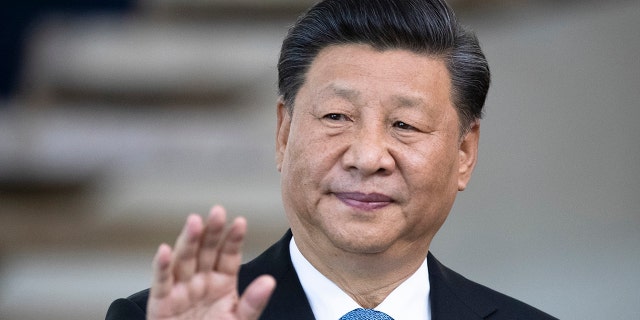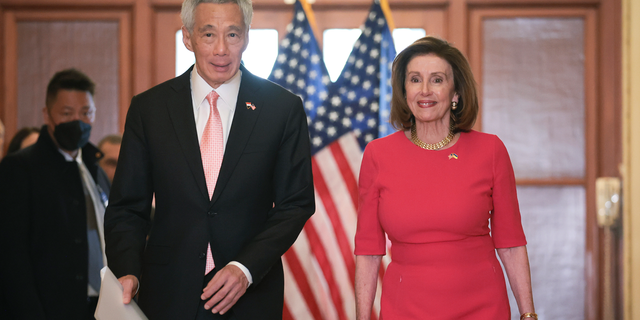The three of us recently traveled halfway around the world to better examine U.S. interests and economic pathways in a region that has garnered significant attention in the news lately.
Meeting and working with government and business leaders in Southeast Asia brought us face-to-face with a stark reality: U.S. influence has been eroded in a part of the world where we were once poised to hold sway, and China has moved in to play an increasingly dominant role. This must change.

FILE – China’s President Xi Jinping greets the media prior to a meeting of leaders of the BRICS emerging economies at the Itamaraty palace in Brasilia, Brazil, on Nov. 14, 2019.
(AP Photo/Pavel Golovkin, Pool, File)
Southeast Asia is diverse. The nations range from highly developed Singapore to rapidly developing Cambodia to deeply troubled Myanmar. Laos and Vietnam have not shed the vestiges of authoritarianism remaining from their communist days, and Thailand once again has fallen into functional military rule.
SINGAPORE PM-IN-WAITING: RECENT DECISIONS BY US, CHINA ‘WILL LEAD US TO MORE DANGEROUS TERRITORY’
While we enjoyed a productive visit to Singapore, much of our focus was on Cambodia. These are two very different countries that delivered to us a consistent message: China is outmaneuvering the United States in this region with investments, loans, trade and exchanges. This is China’s backyard. It has natural advantages of geography, history and culture, and it has been cultivating this region for many years.
Our first impression was the people of Cambodia – their warmth, sincerity, and desire to advance on the world stage. The leaders in these countries told us they prefer a stronger American presence, which they see as a necessary counterweight to China.
CAMBODIAN ARTWORK LOOTED DURING KHMER ROUGE ERA RETURNED BY US AUTHORITIES
They respect and admire the United States. They follow trends in the United States. They send their children to study in the United States. They like the way American companies do business. However, they also told us that they will accept investment and trade from whomever offers it on favorable terms. Our allies in the region—including Japan, South Korea and Australia—are investing and trading there, but they cannot carry our interests.
The United States has many interests in this critical region, and they aren’t all economic. We want to foster greater freedom and openness, both in general principle and as a barrier against Chinese Marxist-Leninist influence. Vietnam and Laos have yet to move away from their communist past.
CHINA STILL BENEFITS FROM RUSSIA RELATIONSHIP, EVEN WITH INTERNATIONAL REPUTATION AT RISK: EXPERTS
Cambodia is emerging as a new nation and is advancing rapidly. Over the past 30 years, it has rebuilt its society from the ground up after the heartless genocide of their population.
The United States must work with these countries over the long term to develop and strengthen economic and political ties and to foster common values. Trade and investment open the door for greater influence and American democratic values that will translate into greater freedom and prosperity for them.
BOWING TO PUTIN’S ‘NUCLEAR BLACKMAIL’ WOULD LEAD CHINA TO INVADE TAIWAN: EX-NATO CHIEF
There are many opportunities for American business in Cambodia, including construction, manufacturing, food processing and other endeavors. We are equipped to meet Cambodia’s demand for energy, particularly cleaner generation offered by LNG and hydropower.

FILE – Speaker of the House Nancy Pelosi (R) (D-CA) accompanies Singapore Prime Minister Lee Hsien Loong (L) at the U.S. Capitol March 30, 2022 in Washington, D.C. Lee, who met with U.S. President Joe Biden on March 29 traveled to Washington for a series of meetings with members of the U.S. government.
((Photo by Win McNamee/Getty Images))
Cambodia is looking to take its place among advanced developing countries. More trade and investment will lead to prosperity and a greater chance to foster the kinds of freedoms that have been the basis of our strongest alliances for decades.
We can take several steps to start moving along this path. First, we need to reauthorize the importation of a broad range of qualified goods under the Generalized System of Preferences (GSP). This is critical to opening the U.S. market to countries in the Asia-Pacific region. Cambodia needs better access to markets in the U.S., its second-largest trading partner.
The U.S. should move quickly to include Cambodia in the Indo-Pacific Economic Framework for Prosperity (IPEF).
CLICK HERE TO GET THE OPINION NEWSLETTER
This will tie it more closely to us and our most important allies and developing country partners in the Asia-Pacific region. IPEF can be a launch point for the United States to reenter the Comprehensive and Progressive Agreement for Trans-Pacific Partnership, which features high-standards trade and market access chapters.
Unfortunately the Biden administration has a moratorium on new trade deals and the Indo-Pacific Economic Framework for Prosperity (IPEF) is a pipe dream unless the administration recognizes the role that Congress plays in setting trade policy.
We have the means to make Southeast Asia a key partnership region. This will lead to the expansion and adoption of U.S. values, including the rule of law, human rights, and upward economic mobility.
CLICK HERE TO GET THE FOX NEWS APP
Free and fair trade, when done well, can lift people out of poverty and provide economic benefits for all countries involved. The U.S. can no longer afford to retreat from the international stage.
A clear presence in the heart of the Indo-Pacific will ensure U.S. interests are well positioned into the 21st Century.
Republican Beth VanDuye represents Texas 24th congressional district in the U.S. House of Representatives.
Republican Ron Estes represents Kansas’ 4th congressional district in the U.S. House of Representatives.
 Iktodaypk Latest international news, sport and comment
Iktodaypk Latest international news, sport and comment









